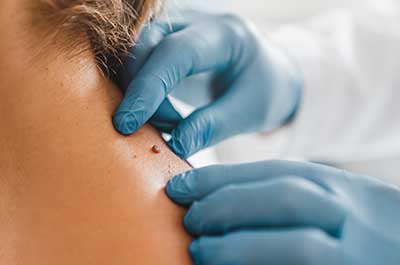Nicotinamide, a form of vitamin B3, is often recommended as an oral supplement for those with a history of skin cancer. This is because it has been shown to reduce the risk of new non-melanoma skin cancers by reducing ultraviolet light damage and enhancing DNA repair, says Jesse Veenstra, M.D., Ph.D., a dermatologist at Henry Ford Health. Now, a recent study has helped validate these findings.
The study, which included more than 33,000 veterans, found taking 500 milligrams of nicotinamide twice daily led to an overall 14% risk reduction in two different types of skin cancers: squamous cell carcinoma and basal cell carcinoma. Those who had one previous skin cancer saw the greatest benefit from taking nicotinamide – their risk of getting another was reduced by 54%. The more previous skin cancers someone had, the less the benefit.
How Nicotinamide May Bolster Immune Function To Prevent Skin Cancer
Risk reduction also varied based upon type of skin cancer; nicotinamide had the greatest benefit in reducing squamous cell carcinoma. “Along with enhancing DNA repair, nicotinamide helps prevent UV-induced immunosuppression, meaning it supports the immune system’s ability to recognize and eliminate precancerous cells,” says Dr. Veenstra. “And squamous cell carcinoma appears to be more dependent on immune surveillance than basal cell carcinoma. This might be why nicotinamide has been shown to have a stronger preventive effect against squamous cell carcinoma.”
Some organ transplant patients also benefited from taking nicotinamide – a population at higher risk of non-melanoma skin cancer. “When you have an organ transplant, you need to take medication to suppress your immune system so your body doesn’t reject your new organ,” says Dr. Veenstra. “Because of this, you’re losing a big part of your immune system’s natural surveillance, which makes it harder to recognize and eliminate cancerous cells. But taking nicotinamide may help partially counteract this for squamous cell carcinoma. While nicotinamide may be helpful for some organ transplant patients, the effect was less dramatic than in patients who were not immunosuppressed.”

Eating Vitamin B3 vs. Taking A Nicotinamide Supplement
Many foods contain vitamin B3 – from poultry, fish and red meat to eggs, dairy, fruits and vegetables. And while you should always eat a well-balanced diet to benefit your overall health, you probably won’t get the levels of nicotinamide from your diet that you would from taking a supplement.
“The good thing about nicotinamide supplements is that you can get them over-the-counter inexpensively or from the pharmacy,” says Dr. Veenstra. “They’re widely available. When you’re getting nicotinamide from solely from diet, by the time your body processes it, you’re probably not absorbing the levels of nicotinamide the study recommends.”
Vitamin B3 is also in many topical skincare products, from lotions to sunscreens and serums. But it’s unknown whether applying it topically has the same beneficial effects in preventing skin cancer.
“There’s not a lot of research on this,” says Dr. Veenstra. “Vitamin B3 and SPF are often included in the same product, so it would be difficult to know whether it’s the vitamin B3 that’s preventing skin cancer or just the sunscreen.”
It’s also important to know that while there are several forms of vitamin B3 (such as niacin) nicotinamide is the only form that has proven to be beneficial for non-melanoma skin cancers.
Who Should Take A Nicotinamide Supplement?
Dr. Veenstra recommends nicotinamide supplements for people who are at high-risk for skin cancer. “If you’ve had significant sun exposure in the past, blistering sunburns, numerous precancerous lesions, or a previous skin cancer, you are probably a good candidate,” he says. “But always talk to your doctor before taking anything. As non-melanoma skin cancers are very slow-growing – and can take years to develop – it’s important to take nicotinamide as a long-term supplement to maintain your protection against skin cancer.”
Reviewed by Jesse Veenstra, MD, PhD, MS, FAAD, a board-certified dermatologist who sees patients at Henry Ford Medical Centers – Ford Road and New Center One.



